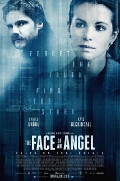
Directed by
Michael Winterbottom
100 minutes
Rated MA
Reviewed by
Bernard Hemingway

The Face Of An Angel
Synopsis: A documentary director (Daniel Brühl) travels to Italy to research a film that he has been hired to make on the murder of an English student.
Michael Winterbottom clearly loves Italy. Whether a serious-minded drama such as Genova (2009) or the light-hearted fol-de-rol of The Trip To Italy (2014) the director is happy to tap into its culture and history and make them a part of our viewing experience. With The Face Of An Angel he takes that tendency to its furthest reach yet. Indeed there are echoes of Antonioni and Bertolucci in this story of a troubled documentary director confronting the impossibility of telling the truth in film, or for that matter any medium.
Based on a book by Barbie Latza Nadeau and scripted by Paul Viragh, the film draws on the real life story of Meredith Kercher, a 21-year-old British student murdered in Perugia in November 2007. The case became a media circus when Kercher's roommate, Amanda Knox and her then-boyfriend, Raffaele Sollecito, were arrested, tried and found guilty of the murder only to be acquitted on appeal. Although the names are changed, the main facts of the case are supplied to us.
Winterbottom’s film is not about the murder however so much as Thomas, the director who has come to the scene of the crime to try and understand what happened. But that is only part of the matter at hand as Thomas is estranged from the mother of his daughter, must negotiate the commercial demands of his employers and the glib cynicism of the journalists with whom he surrounds himself (one of whom, played by Kate Beckinsale, he has a fling with) and searches in Dante for a way of grounding his script. In this respect the film is a kind of serious companion piece to Winterbottom’s 2005 film, Tristram Shandy, with the purported purpose of the endeavour receding as time accrues and Thomas's nerves fray under the pressures of his situation.
At times some of the distractions Winterbottom throws at Thomas and us seem counter-effective. The fling with Beckinsale’s Simone appears too much like the conventional romantic interest device. Then there is Thomas’ inexplicable relationship with a spunky young waitress, Melanie (Cara Delevingne). It comes out of nowhere and keeps returning with improbable frequency.
Although these aspects are not seamlessly or even well integrated into the narrative, the female presence (at least in its guise of beauty) is critical to the film. Ranging as they do from Thomas’ innocent young daughter, Bea, to Dante’s idealized Béatrice, Simone’s worldly-wise realism to Melanie’s unspoilt trust they all seem intended to represent facets of the female experience. The central event, the savage murder of an attractive young woman thus becomes the catalyst for a reflection on the relationship between sex and violence, particularly against women (at one point Thomas fantasizes about stabbing his estranged girlfriend while she is mounted on her new lover). Winterbottom’s film is not going to change anything in this respect but it is important that he dedicates it to Kercher.
Winterbottom is a remarkably prolific and wide-ranging director and there is a sense here that more time invested on developing the film would have strengthened it . But equally there is a sense in which the director wants us to complete his work. In this respect The Face Of An Angel is not a film for lazy film-goers but it is an interesting one that will reward your effort.

Want more about this film?


Want something different?




